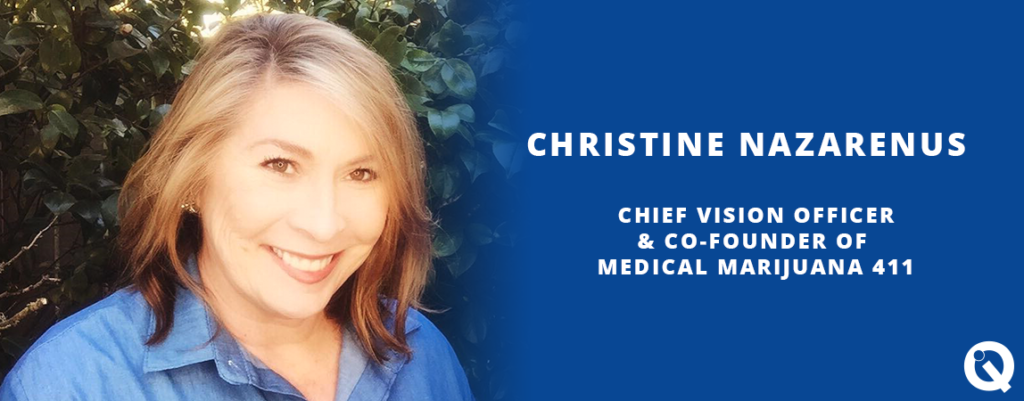Christine Nazarenus is Chief Vision Officer and Co-Founder of Medical Marijuana 411, which provides online resources for medical cannabis education.
You were working in a technology company and founded your first start up in 1998. The Indianapolis Motor Speedway was your first client and later you developed a company focused on the character driven stories of racers. How did you get involved with medicinal marijuana education?
With my racing connections, I was introduced to Greg Tracy, a racing star and Hollywood stuntman. Greg was telling me about his grandmother, who was dying. Someone suggested she try medical marijuana. It improved her quality of life at the end greatly. I had some relatives who also benefited from using medical marijuana. The conversation with Greg was the “a-ha” moment that made me want to find out more about medical marijuana. That was about ten years ago. The problem back then? The lack of credible, research-based information on medical marijuana. Medical Marijuana 411 filled that gap. From the very beginning, our aim was to tell the story of medical marijuana and make sure it’s credible and medically relevant. We never “touched” any product. Even with a social media following of over 1 million fans, we purposely stayed true to the patient story. We did not sell advertising space, sponsored posts, or any endorsement to any cannabis related brand — and still don’t.
Can you describe your work with Washington and Alaska to educate marijuana dispensary workers?
Washington State legalized recreational marijuana in 2012, but the state still wanted to focus on medicinal patients. So, the requirement would be that anyone working with medical patients within a dispensary had to be certified by a state-approved educational company…Medical Marijuana 411 was approved by the Washington Department of Health as one of three vendors permitted to offer the state required certification. We also are approved in Alaska to offer the state required Alaska Marijuana Handler’s Card for any person involved in cannabis in Alaska. The requirements are slightly different in each state. We were approved for American Medical Association AMA PRA Category 1 Credit(s)™, Accreditation Council for Pharmacy Education and Nurses Credentialing Center’s Commission on Accreditation for our CME courses. Many states require medical marijuana physician education and we are focused on securing other states, and providing education in other countries.
What educational areas do you cover?
The main thing for dispensary workers, consultants or “budtenders” to understand is that they are not medical professionals. They cannot give medical advice. They do need to understand the products that they are selling. The focus for all of our courses is the actual science behind cannabis and the endocannabinoid system, such as the differences between CBD and THC. What do cannabinoids do in the endocannabinoid system? I think that about 85 percent of medical professionals aren’t even trained in medical school about the endocannabinoid system —and it’s the largest receptor system in your body. We have other courses, including courses for patients. All of our content is based on science, with clickable endnotes within the courses to expand the research if you want dive deeper.
Quality Institute members can receive a discount for your educational program, which provides CME credits. What will they learn?
Our CME activity gives physicians, nurses and pharmacists access to accurate and unbiased information about medical cannabis, and the research behind why patients are seeing positive results from medical cannabis use. There is so much information available to patients, but frankly much of it is inaccurate and touts the praises of a miracle drug. We want medical providers to have informed conversations with their patients that minimize the stigma associated with cannabis use and maximize the best patient care.
Do you see continued barriers to educating consumers and clinicians about marijuana?
Yes, the whole problem is that cannabis is a Schedule 1 drug by federal definition. That means there is no medicinal value to cannabis. So if there’s no value, then how, can, and why would you spend money to research it? And technically testing marijuana is federally illegal, right? So it’s hard even for a company like ours to have bank accounts. There are so many hoops that you have to jump through to be in the medical marijuana space. The positive is there are certain countries — Israel is one — opening up the research side of things. So I’m hopeful. I think the one thing that needs to happen is that cannabis needs to be rescheduled. That would open up many doors here.

